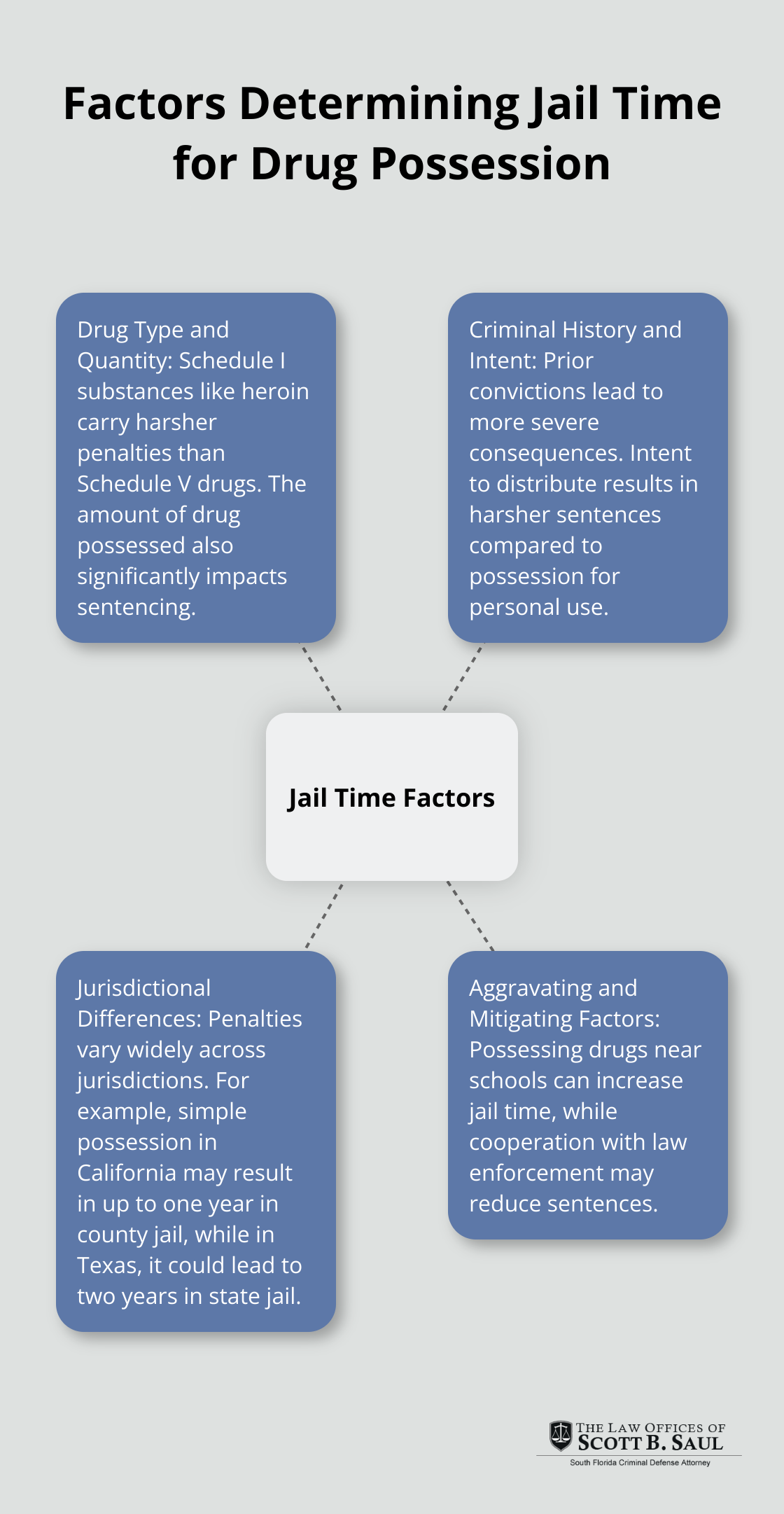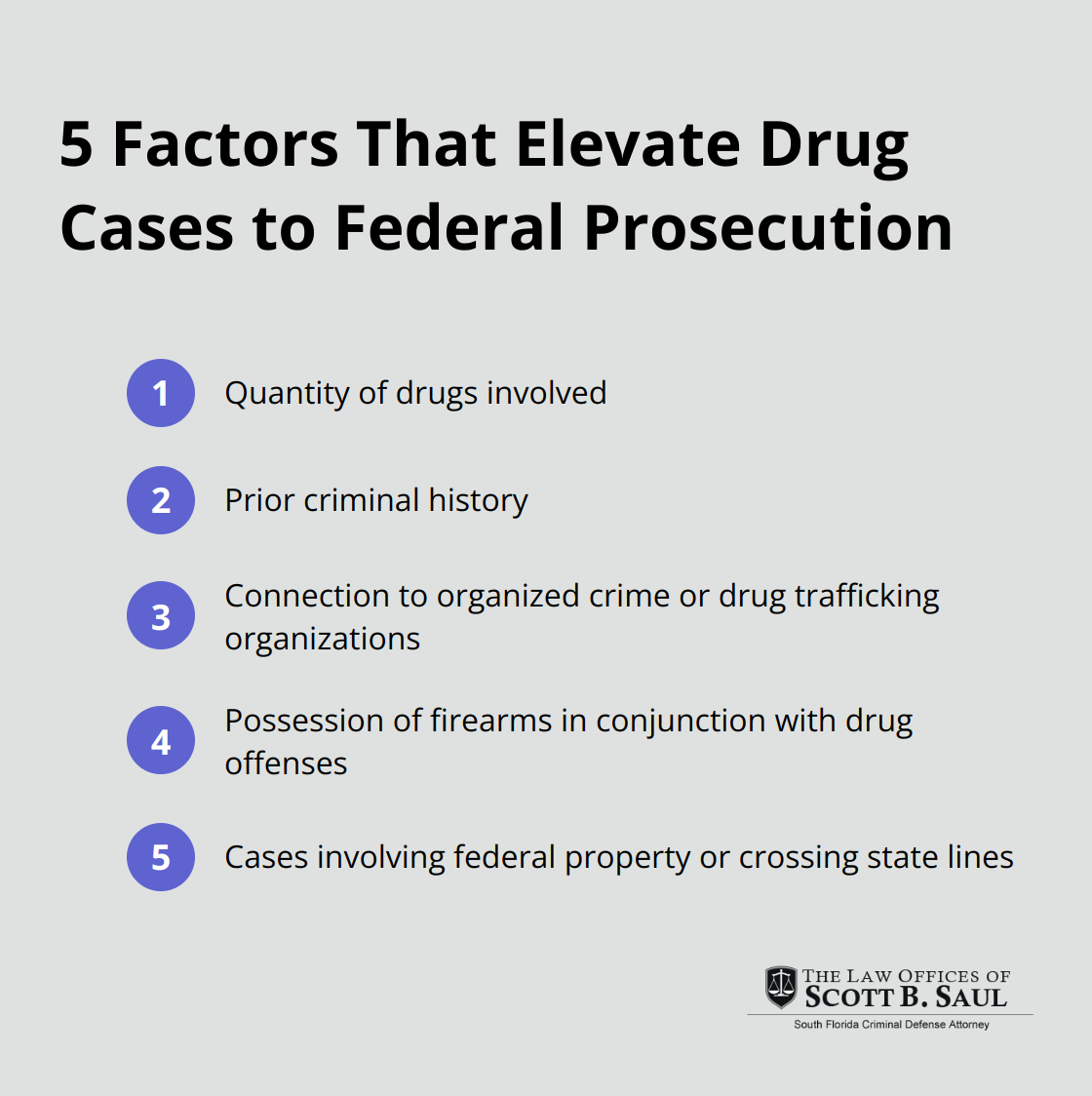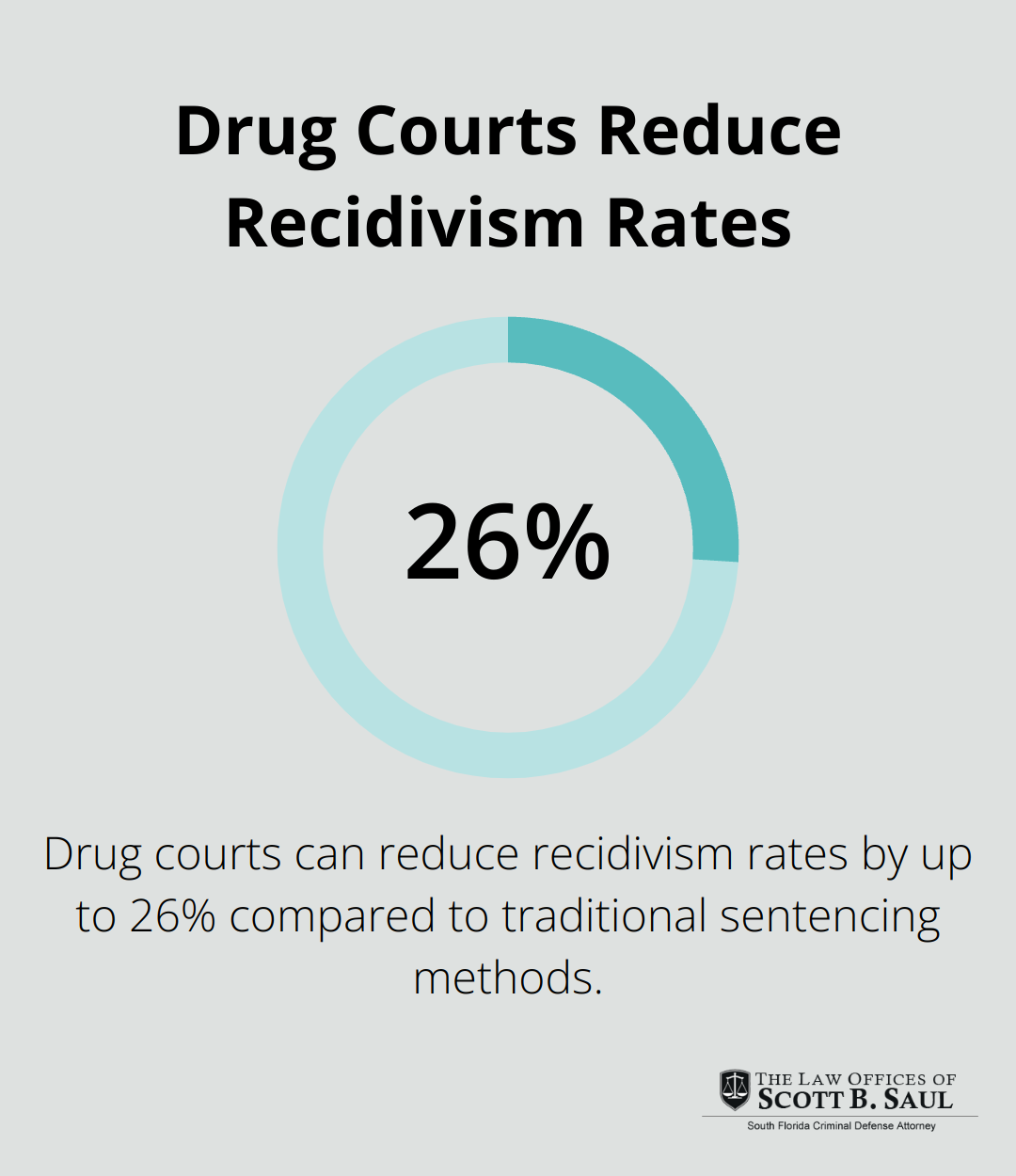How Long Is Jail Time for Drug Possession?
By : saulcrim | Category : Criminal Defense | Comments Off on How Long Is Jail Time for Drug Possession?
12th May 2025

Drug possession charges can have serious consequences, including potential jail time. The severity of these consequences often depends on various factors, making it difficult to predict exact sentences.
At Law Offices of Scott B. Saul, we understand the complexities surrounding jail time for drug possession cases. This blog post will explore the key elements that influence sentencing, compare federal and state charges, and discuss alternative options available to those facing drug possession allegations.
What Determines Jail Time for Drug Possession?
Drug possession charges can result in varying jail sentences based on several key factors. Understanding these elements helps individuals grasp the severity of their situation and the importance of legal counsel.

Drug Type and Quantity
The type and amount of drug involved significantly influence sentences. Possession of Schedule I substances (e.g., heroin or LSD) typically carries harsher penalties than Schedule V drugs. Federal penalties for possession of 100-999 grams of heroin or 1-9 grams of LSD mixture can result in severe consequences. In contrast, possession of small amounts of marijuana in some states might only lead to fines or short jail terms.
Criminal History and Intent
Prior convictions heavily impact sentencing. First-time offenders often receive lighter sentences, while repeat offenders face more severe consequences. The U.S. Sentencing Commission has examined the use and impact of mandatory minimum penalties for drug offenses in the federal system, highlighting the importance of understanding these penalties.
Intent also plays a role. Possession for personal use generally results in lighter sentences compared to possession with intent to distribute. Law enforcement considers factors like drug quantity, packaging, and the presence of scales or large amounts of cash when determining intent.
Jurisdictional Differences
Penalties for drug possession vary widely across jurisdictions. In California, simple possession of most drugs is a misdemeanor with a maximum sentence of one year in county jail. However, in Texas, possession of less than one gram of cocaine is a state jail felony, punishable by up to two years in state jail.
Aggravating and Mitigating Factors
Courts consider various aggravating and mitigating factors when determining sentences. Aggravating factors, such as possessing drugs near schools or involving minors in drug-related activities, can increase jail time. Conversely, mitigating factors like cooperation with law enforcement or demonstrating efforts towards rehabilitation can lead to reduced sentences.
The complexities of drug laws and the potential for severe consequences underscore the importance of seeking experienced legal representation. As we move forward, we’ll explore the differences between federal and state drug possession charges, which further complicate the sentencing landscape.
Federal vs State Drug Charges: Key Differences
Drug possession charges can be prosecuted at both the federal and state levels, each with its own set of laws, penalties, and procedures. Understanding these differences is essential for anyone facing drug possession charges.
Federal Drug Possession Charges
Federal drug charges typically involve larger quantities of drugs, interstate trafficking, or cases that cross state lines. The U.S. Sentencing Commission reports on federal sentencing statistics, comparing data across judicial districts and circuits. Federal drug offenses often carry severe penalties. For example, possession of 5 kilograms or more of cocaine can result in a mandatory minimum sentence of 10 years to life in federal prison.
Federal cases often involve mandatory minimum sentences, which limit a judge’s discretion in sentencing. These minimums can lead to lengthy prison terms, even for first-time offenders. The Anti-Drug Abuse Act of 1986 established many of these mandatory minimums, which have been a subject of ongoing debate and reform efforts. Recent evidence suggests that mandatory minimum sentences produce substantial harm without overall benefit to crime control.
State Drug Possession Charges
State drug laws vary widely across the country. In general, state charges for drug possession tend to be less severe than federal charges, especially for smaller quantities intended for personal use. For instance, in Florida, possession of less than 20 grams of marijuana is a misdemeanor punishable by up to one year in jail and a $1,000 fine.
Some states have implemented drug courts and diversion programs aimed at rehabilitation rather than punishment. These programs can offer alternatives to incarceration for eligible offenders, focusing on treatment and recovery.
Factors That Elevate to Federal Prosecution
Several factors can elevate a drug possession case from state to federal court:

The decision to prosecute at the federal level often involves coordination between local law enforcement and federal agencies like the Drug Enforcement Administration (DEA).
Impact of Jurisdiction on Defense Strategy
The jurisdiction (federal or state) in which a case is tried significantly impacts the defense strategy. Federal cases often require a more complex approach due to the severity of potential sentences and the resources available to federal prosecutors. State cases, while still serious, may offer more opportunities for alternative sentencing or plea bargains.
Experienced defense attorneys (like those at Law Offices of Scott B. Saul) understand the nuances of both federal and state drug laws. This knowledge allows them to craft tailored defense strategies that account for the specific challenges presented by each jurisdiction.
The stark differences between federal and state drug charges underscore the importance of seeking qualified legal representation. As we explore in the next section, various alternative sentencing options may be available, depending on the nature of the charges and the jurisdiction of the case.
Alternatives to Jail Time for Drug Possession
The criminal justice system now recognizes that incarceration isn’t always the best solution for drug possession offenses. Alternative sentencing options address the root causes of drug-related crimes while reducing recidivism rates. These programs offer a path to rehabilitation and a second chance for many offenders.
Drug Court Programs
Drug courts have become popular as an effective alternative to traditional sentencing. These specialized court programs provide supervision, drug testing, and treatment services to non-violent offenders with substance abuse issues. Drug courts reduce recidivism by 17 to 26 percent compared to traditional sentencing.

Participants in drug court programs typically undergo intensive treatment, regular court appearances, and random drug testing. Successful completion can lead to reduced charges or case dismissal. However, failure to comply with program requirements may result in traditional sentencing.
Rehabilitation and Community Service
Many jurisdictions offer rehabilitation programs as an alternative to jail time for drug possession offenses. These programs focus on addressing addiction and provide tools for long-term recovery. Inpatient and outpatient treatment options may be available (depending on the severity of the addiction and the offender’s circumstances).
Community service allows offenders to give back to their communities while avoiding incarceration. This option often combines with other rehabilitative measures and can help individuals develop new skills and connections.
Plea Bargains and Sentencing Alternatives
Plea bargains play a significant role in resolving drug possession cases. Defense attorneys can negotiate with prosecutors to reduce charges or secure alternative sentencing options. This may involve pleading guilty to a lesser offense in exchange for a more favorable sentencing outcome or participation in a diversion program.
Sentencing alternatives like probation or house arrest allow offenders to remain in their communities under supervision. These options often come with conditions such as drug testing, counseling, and regular check-ins with probation officers.
Eligibility for Alternative Sentencing
The availability and effectiveness of these alternative sentencing options vary by jurisdiction and individual circumstances. Factors such as the type and quantity of drugs involved, prior criminal history, and the defendant’s willingness to participate in treatment programs all influence eligibility for these alternatives.
While alternative sentencing options offer hope for many facing drug possession charges, navigating the legal system remains complex. Experienced defense attorneys (such as those at Law Offices of Scott B. Saul) can provide invaluable guidance in exploring these options and securing the best possible outcome for their clients.
Final Thoughts
Drug possession charges can lead to significant jail time and have far-reaching consequences beyond incarceration. The legal landscape continues to evolve, with many jurisdictions adopting more rehabilitative approaches. However, the risk of substantial jail time for drug possession remains a reality for many individuals.
Expert legal guidance proves essential when facing drug possession charges. At Law Offices of Scott B. Saul, we bring decades of experience in criminal defense to every case we handle. Our team specializes in defending tourists and foreign travelers facing drug charges in South Florida, using our unique insights as former prosecutors to build strong defense strategies.
We understand the nuances of both federal and state drug laws and work diligently to explore all possible alternatives to jail time for our clients. If you face drug possession charges or worry about potential jail time, seek professional legal advice immediately. Your future may depend on the actions you take today.
Archives
- May 2025 (4)
- April 2025 (8)
- March 2025 (9)
- February 2025 (8)
- January 2025 (9)
- December 2024 (10)
- November 2024 (5)
- July 2024 (2)
- June 2024 (2)
- May 2024 (2)
- April 2024 (2)
- March 2024 (2)
- February 2024 (2)
- January 2024 (2)
- December 2023 (2)
- November 2023 (2)
- October 2023 (2)
- September 2023 (2)
- August 2023 (1)
- July 2023 (2)
- June 2023 (2)
- May 2023 (2)
- April 2023 (2)
- March 2023 (2)
- February 2023 (2)
- January 2023 (2)
- December 2022 (2)
- November 2022 (2)
- October 2022 (2)
- September 2022 (2)
- August 2022 (2)
- July 2022 (2)
- June 2022 (2)
- May 2022 (2)
- April 2022 (2)
- March 2022 (2)
- February 2022 (2)
- January 2022 (2)
- December 2021 (2)
- November 2021 (2)
- October 2021 (2)
- September 2021 (2)
- August 2021 (2)
- July 2021 (2)
- June 2021 (2)
- May 2021 (2)
- April 2021 (2)
- September 2020 (5)
- July 2020 (4)
- June 2020 (4)
- May 2020 (4)
- April 2020 (5)
- March 2020 (4)
- February 2020 (4)
- January 2020 (4)
- December 2019 (1)
- November 2019 (4)
- October 2019 (4)
- September 2019 (4)
- August 2019 (4)
- July 2019 (5)
- June 2019 (4)
- May 2019 (4)
- April 2019 (4)
- March 2019 (4)
- February 2019 (4)
- January 2019 (4)
- December 2018 (4)
- November 2018 (5)
- October 2018 (5)
- September 2018 (4)
- August 2018 (4)
- July 2018 (7)
- June 2018 (4)
- May 2018 (4)
- April 2018 (8)
- March 2018 (4)
- February 2018 (4)
- January 2018 (4)
- November 2017 (4)
- October 2017 (4)
- September 2017 (4)
- August 2017 (7)
- July 2017 (6)
- June 2017 (4)
- May 2017 (4)
- April 2017 (4)
- March 2017 (4)
- February 2017 (7)
- January 2017 (4)
- December 2016 (7)
- November 2016 (4)
- October 2016 (4)
- September 2016 (10)
- August 2016 (4)
- July 2016 (4)
- June 2016 (4)
- May 2016 (4)
- April 2016 (4)
- March 2016 (4)
- February 2016 (7)
- January 2016 (4)
- December 2015 (5)
- November 2015 (4)
- October 2015 (7)
- September 2015 (4)
- August 2015 (4)
- July 2015 (13)
- June 2015 (9)
- May 2015 (8)
- April 2015 (6)
- March 2015 (4)
- February 2015 (4)
- January 2015 (4)
- December 2014 (4)
- November 2014 (4)
- October 2014 (4)
- September 2014 (3)
Categories
- Adjudication (1)
- Bankruptcy (1)
- Burglary Crimes (3)
- calendar call (1)
- Car Accident (1)
- Criminal Defense (317)
- Cyber Crimes (7)
- DNA (1)
- Domestic Violence (9)
- Drug Crimes (5)
- DUI (12)
- Embezzlement (1)
- Environmental Crimes (4)
- Expungement Law (2)
- Federal Sentencing Law (3)
- Firearm (3)
- Forgery (4)
- General (82)
- Healthcare (3)
- Immigration (1)
- Indentity Theft (1)
- Insurance (5)
- judicial sounding (2)
- Juvenile Crimes (4)
- Manslaughter (4)
- Money Laundering (3)
- Organized Crime (1)
- Racketeering (1)
- Reckless Driving (3)
- RICO (3)
- Sealing and Expunging (2)
- Sex Offense (1)
- Shoplifting (1)
- Suspended Driver's License (1)
- Traffic (4)
- Trending Topics (1)
- White-collar Offenses (1)

